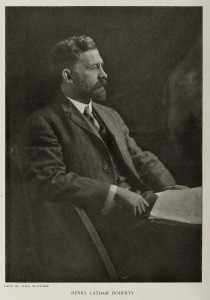Henry Latham Doherty Quotes
The man who invents and creates, the man who improves on old methods, — a man who is a leader is the man worth while.
To be a leader, to put away old methods and follow some untried path is to bring down a certain amount of adverse criticism. If the man can not weather the fault-finding until his method is demonstrated to- be a practical one, he will never make much headway.
Henry L. Doherty is the type of a man who is a leader. He is a man who refuses to accept any set rule for life until he has tested that rule and found he can not improve upon it. He wants the new way, the undiscovered way of reaching an end. He will follow it if, after due deliberation, he makes up his mind that it is practical. He is the type of man
who thinks ahead. Because men who have made a success of life in the past followed such and such a rule, it is not enough for Mr. Doherty that he should follow it. Maybe there is a better way; if there is, he wants to find it. Like all men who have made any success of their natural talent, he has the solid foundation for building on the right kind of rules.
He closely follows the rules of life of honesty and hard work. But with all his tremendous duties he is like other folks of flesh and bone. He can laugh, he can play, he smokes, — he likes the society of friends.
Mr. Doherty is one of the younger generation of men to invade Wall street, but he is not like the accepted type of Wall street man. He is not a speculator on the market. He is a speculator to this extent,- — he speculates on his ways of doing business, his experience and ideas, and he has yet to report a failure.
In the towering hive of humanity at No. 60 Wall street, New York, Mr. Doherty has a suite of offices that take up half of the fourteenth floor. There it is that he directs his investments in the gas and electrical field, surrounded by an organization of engineers, accountants, and attorneys that he has been building up for years. In more than a dozen cities he has men who are keeping constantly in touch with the progress of the public utility corporation business, — experimenting, investigating, carrying out his suggestions and ideas.
A year ago it was impractical to approach Mr. Doherty with a request for his photograph. His name in cold type would cause him to shudder with fear. And still he numbers newspaper and magazine writers among his best friends. In fact, among the forty odd clubs of which he is a member, three are press clubs.
“Why not, let me write a story of your life?” a newspaper friend said once upon a time.
“Wait until I accomplish something,” was the reply.
“But you have accomplished something. You have grown from a boy to manhood, self-educated, self-made. You became a gas engineer, an electric engineer. You are president of gas and electric companies, you own companies, you are vice-president and consulting engineer of the American Light and Traction Company, — you are head of the firm of Henry L. Doherty & Company, bankers; you are a Wall street magnate — ”
“Speaking of opals,” broke in Mr. Doherty, “I have an extra odd one that I have just added to my collection of stones. It is yours, my dear fellow, if you will please forget what I have done and tell me what I have not done. That’s of more importance.”
And there the effort of getting the story of the success of Henry L. Doherty ended for the time.
“If I had not become interested in the gas and electric business, I think I would have made a newspaper man,” Mr. Doherty said recently. “I liked the business — I like the newspaper men. They represent to me one of the highest types of men we have — that is, if they always follow the rule they should, — do the best they can. Like some engineers, they may cheat themselves at times. We marvel at the progress of electricity — I marvel at the great advancement made in the world of letters.”
Mr. Doherty started his career in the gas world at Columbus, Ohio, under the tutelage of Emerson McMillin — a man who, Mr. Doherty claims, is the best gas man in the country. There may be better gas engineers, better electrical engineers than Mr. Doherty, but there is no better combined gas and electrical engineer.
In association work of gas and electric companies he has been one of the pioneers in advancing the cause. The Doherty rate for charging for gas and electricity and the Doherty new business methods have been up for discussion during recent years. The Doherty gas calorimeter, furnace combustion regulator, tar extractor, gas purifier, gas air compressor, and on to a score and one other inventions came from the fertile brain of Mr. Doherty.
While still a young man, Mr. Doherty has spent more than twenty-five years in the gas and electric business. He is never satisfied with what he does or has done; he is constantly striving to improve and to advance. For a year past, in addition to giving his time to managing and operating nearly a score of plants and gas works, including one street railway and water company, he has been turning his attention to the buying of new properties. He has a following of Western bankers and men of money who take his word without question.
Recently Mr. Doherty acquired a new property. The purchase price was over $1,000,000. The entire money for securing this property was subscribed by friends.
“I have a good property in sight. Will take a million. How much stock do you want?” was the question sent out by Mr. Doherty.
One man answered: “What and where is the property? Count on me for $50,000 if O. K.”
“Can’t tell you about property now. My word goes with it.”
“Give me $100,000 worth if your word goes along,” came back the answer.
That true little incident indicates the blind confidence his friends and associates have in his ability and judgment.
“When you make a friend, keep him. You can keep him only by being right and fair,” is the motto on which Mr. Doherty is doing business.
“The electrical business — it is old to say it — but we are only getting started,” said Mr. Doherty. “Today the best indications that this is true are the constantly growing followers of public utility corporations. Management has become a science in these stations — even as great as service.
We have demonstrated that we must keep in touch with the public, deserve the good will of the public by being fair and giving them the best service at the least possible cost. A central station run on that principle has no reason for failure.”

